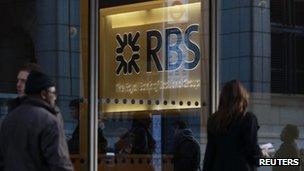What is ‘appropriate’ pay at RBS?
- Published
- comments

Royal Bank of Scotland's shares have slumped more than 40% over the past year - so that taxpayers currently face losses of around £23bn on their 81% stake in the bank.
RBS has shed many thousands of jobs in that period. Also it recently announced that its investment bank was performing worse than it hoped, so RBS is abandoning share trading and advising companies on takeovers - and a further 3,500 jobs will go.
As for lending to small business, RBS has to date marginally missed the so-called "stretch" targets it agreed with the government under the Project Merlin agreement - and like all the big banks, it stands accused of not doing enough to support smaller or younger companies that represent the UK's economic future.
So it is unsurprising that much of the media - and many of you in the comments you leave here and on Twitter - say that it would be little short of a scandal if the bank's senior executives were to receive big pay awards when bonuses and longer-term performance rewards are decided early next month.
What are the potential rewards for those who run RBS?
On the basis of RBS's current share price, the remuneration of the chief executive, Stephen Hester, could be a bit over £7m for 2011, if he were awarded his maximum bonus and long-term investment plan allocation.
It would be slightly odd if he received his maximum entitlement. But my understanding is that RBS's non-executives feel he does deserve a fair sized bonus.
Then there is John Hourican, who stands to receive shares worth over £5m that were allocated to him - subject to performance conditions - when he took charge of the investment bank three years ago. They will come on top of his earnings for the past year, and it would be highly surprising if they weren't millions of pounds.
Also RBS's chairman Sir Philip Hampton will receive shares worth just over £1m if the bank's remuneration committee deems that he has "led the successful and sustainable rebuilding of the group".
What's more, plenty of investment bankers at RBS will receive rewards running to several million pounds.
Because the investment bank has performed worse than in the previous year - as is typical of the industry - those rewards may halve. But pay of £3m or £4m still looks a huge amount of money, when millions of British people are enduring what's widely seen as the toughest squeeze on living standards since reliable records first became available (so for at least 60 years).
Today's Daily Mail asks of RBS, external: "How, in the name of decency, can a publicly-owned bank be allowed to behave like this?" The Mail isn't the first and won't be the last newspaper to express outrage at what bankers will pocket in the coming bonus round.
The contrast with the view on the board and among many big shareholders could not be greater. They see a management team struggling to fix a huge and complex organisation, whose flaws were created by a previous team of executives, in a terrible financial climate not of RBS's making.
Their view would be that RBS is a much stronger bank than it was. And if that is not yet reflected in profits and share price, it is the inclement external environment that's to blame.
For example, they would say that the collapse in the bank's share price is largely due to the eurozone crisis, which has whacked the shares of all banks.
And if RBS has not provided all the credit it could have done to smaller businesses, that may reflect its position as far and away the biggest small-business bank: if many small businesses currently lack the confidence to invest (which surveys suggest is the case), RBS finds it hardest to disguise that trend.
For almost all the negatives about the bank perceived from the outside, the bank's non-executives and a good number of its biggest investors would point to extenuating factors.
They would argue that it's only fair that RBS's chief executive, chairman and investment-banking boss should be "appropriately" rewarded for successes in putting the bank on firmer foundations.
The problem is that there is a world of difference between what is deemed to be an appropriate reward at the top of big companies - and not just banks - and what many of you would see as appropriate.
Quite how views on pay from inside not just this bank but any bank can be reconciled with outside views completely defeats me.
As one senior banker said to me, it's bankers' pay that more than anything else prevents banks from restoring their public reputations - but he didn't have the faintest notion how to align remuneration with what would be widely seen as decent, and thus mend the poisonous relationship between finance and people.